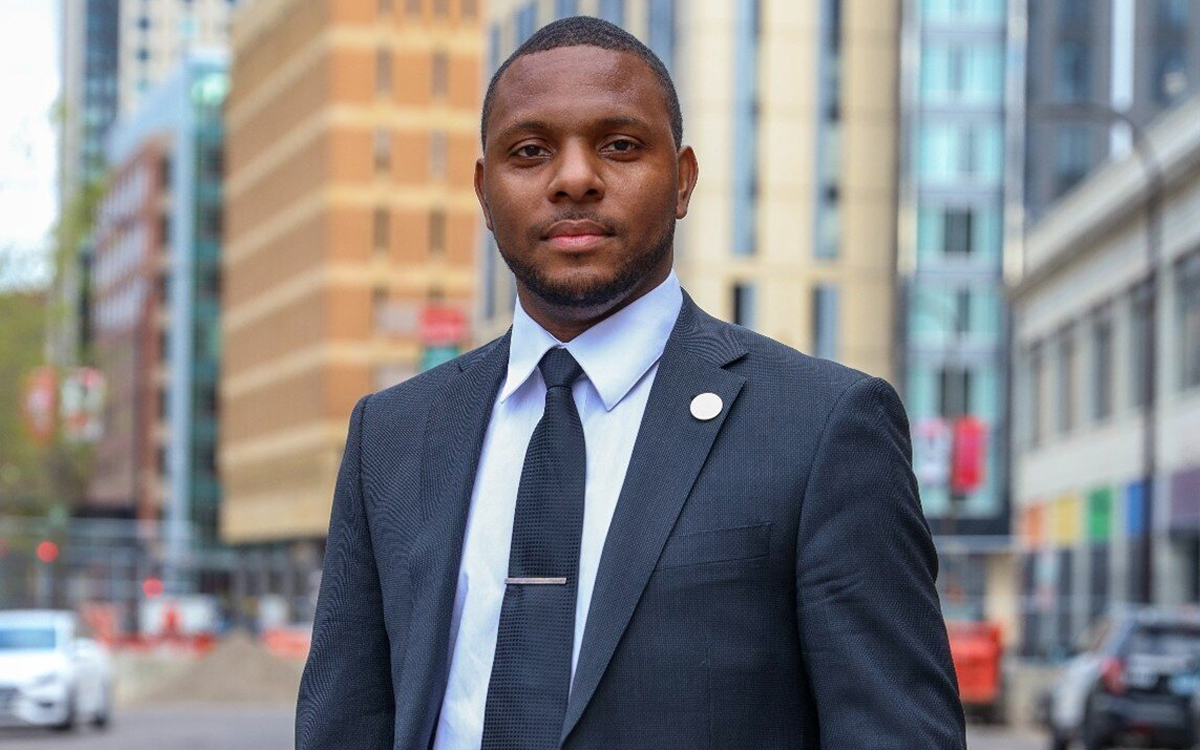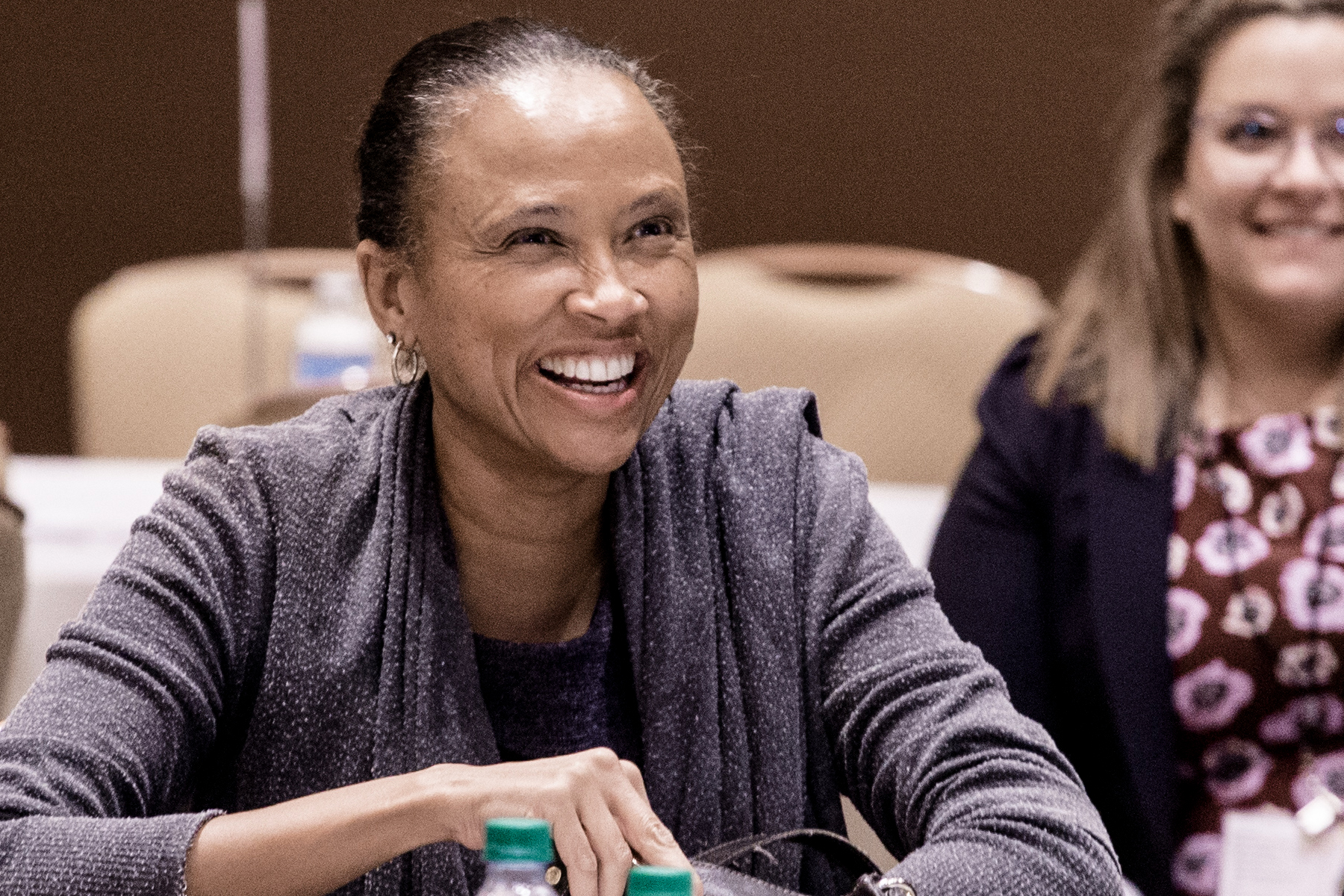Racial Equity Roundtable
As a founding member of the World Economic Forums’ Global Alliance for Social Entrepreneurship, Echoing Green leads the Social Innovation Leadership Group (SILG), in partnership with the Schwab Foundation and with the generous support of the GHR Foundation. With this group Echoing Green aims to elevate the voices of social innovation leaders to influence the racial equity agenda of the Forum, and its members.
As part of SILG’s mission at Davos, Echoing Green’s Vice President of Thought Leadership Liza Mueller moderated a hybrid round-table conversation with Tiffany Thompson, Senior Director of Equity and Partnerships at Echoing Green, Echoing Green Fellows Laurin Leonard ’18, Elizer Darris ’22, Karen Tse ’02, and Schwab Foundation for Social Entrepreneurship Social Entrepreneur Lindiwe Matlali, exploring how corporations can follow through on their 2020 overtures towards racial equity by supporting Black social innovators.
When asked about the relationship between stakeholders and social innovators in racial equity work, Elizer Darris ‘22 (The Legal Revolution) explained that as a social innovator, he views the community he serves through a highly inclusive lens. For Elizer, this community is not only those served through The Legal Revolution; it includes government, corporate, and philanthropic partners who work with him to achieve social change. He asserted, “I cannot move forward as a social entrepreneur without tapping into the community, or they will hold me accountable.”
The necessity of tapping into communities is also highlighted in Echoing Green’s latest report, Black Voices, Black Spaces: The Proximate Power of Black Innovation. For funders to commit to racial justice, they must listen to Black communities and take the lead of those social innovators uplifted by the community. As people who are of the communities they serve, Laurin, Elizer, and Lindiwe exemplify the impact that can be created when Black social innovators are adequately funded and hold decision-making power.
 I cannot move forward as a social entrepreneur without tapping into the community, or they will hold me accountable.
I cannot move forward as a social entrepreneur without tapping into the community, or they will hold me accountable.
Elizer Darris ‘22, co-executive director of The Legal Revolution

Social Innovation’s Untapped Potential
As the world navigates a poly-crisis landscape, the opportunity for social innovators has never been greater. Social innovators have historically been the driving force behind cutting-edge answers to many of the complex problems we are currently facing, producing new ideas with the potential to scale through public-private collaboration.
In partnership with the Schwab Foundation for Social Entrepreneurship and the Global Alliance for Social Innovation, Echoing Green is elevating the transformational leaders who are already hard at work on solutions with the potential to heal our fragmented world.
No matter the challenge, social innovators act as a catalyst for action and access to positive change. As the global democratic landscape is backsliding into authoritarianism, social innovation offers a lifeline towards the construction of a better world.
The Echoing Green Fellow Community at Davos
On the Frontlines of Equality
In partnership with Handshake Partners and the United Nations Foundation, Echoing Green Fellows Karen Tse ‘02 (International Bridges to Justice) and Ajaita Shah ‘12 (Frontier Markets) spoke with Ndidi Okonkwo Nwuneli (LEAP Africa), Chmba Ellen Chilemba (Tiwale), and Nina Levchuk (Google) in “Resilience and Readiness: Conversation with Champions for Change on the Frontlines of Equality.”
Echoing Green Chief of Staff Joanna Helou helped shape this round-table discussion which explored the different paths taken towards amplifying the voices of those in need and tapping into underserved markets through the law, finance, art, and job-training. Further, in a conference where 80% of attendees are male, this panel of women changemakers highlighted how necessary continued investment in social innovation is to achieving equality.
How Black innovation can achieve racial equity and drive business goals
In collaboration with 2018 Fellow Laurin Leonard and CEO of CUFA Favela Holding, Celso Athayde, Echoing Green President Cheryl Dorsey authored an article for the World Economic Forum outlining three steps that businesses must take to harness the power of Black innovation.
Supported by research from Echoing Green and the Global Alliance for Social Entrepreneurship, the need to view social innovation as a catalyst for change, commit to building lasting partnerships with innovators, and work to broaden funding support networks is identified as crucial to supporting the work of Black social entrepreneurs. By making these commitments, businesses will be able to empower the Black social innovators who are already working on solutions to societal problems towards success and positive change.
Shivani Siroya on “Financial Inclusion Beyond Access”
2011 Fellow Shivani Siroya, Founder and CEO of emerging-markets digital lender Tala, participated in “Financial Inclusion Beyond Access,” where she discussed strategies to increase economic and funding inclusion for adults in underserved markets.
When asked about her views on how to increase banking access in underserved markets, Shivani responded “We’ve now served 1.5 million women small business owners across these markets and I think it is really critical to understand their needs, but I go back to trust and value. We have to find ways to start with that trust, that privacy, and then from there provide the incentives and value so that a woman can come in and continue to build her financial life with you.”
Ajaita Shah ‘12 Announces Increased Investment in Women’s Entrepreneurship Initiative
Speaking at the Female Quotient Equality Lounge on womens’ role in strengthening the impact economy, Ajaita Shah ‘12 (Frontier Markets) announced increased investment in the She Leads Bharat Initiative (SHB). Grown out of her work at Frontier Markets connecting women in rural India to an inclusive and supportive e-commerce marketplace, SHB seeks to create an all-encompassing entrepreneurship academy and incubator for women in rural areas across the country.
The increased funding Ajaita announced during the World Economic Forum will allow SHB to grow its member base to 100 million female entrepreneurs, funders, and mentors by 2030. With plans to expand to two more Indian states, and increased partnerships with governments, civil society, and business leaders, SHB will be able to serve even more women in every stage of entrepreneurial development.
The International Refugee Assistance Project on Climate Migration
Ama Francis, Climate Strategist for the International Refugee Assistance Project co-founded by Becca Heller ‘10, spoke on two panels discussing solutions to growing climate migration and the potential opportunities that climate migration can create.
In “Pack Up and Go – Climate Migration,” Ama spoke with Yuki Hasegawa (Tohoku General HQ, The Yomiuri Shimbun), Heidi Larsson (London School of Hygiene and Tropical Medicine), Anne Beathe Tvinnereim (Norway Government), Agnes Callamard (Amnesty International), and Deng Dak Malual (Kakumba Hub) about the risks posed by increased climate migration as the planet warms, as well as the humanitarian solutions necessary to support those who are displaced by climate disaster.
In “People on the Move: Seeing the Opportunities,” Ama conversed with Sara Pantuliano (ODI) and H.R.H. Prince Jaime de Bourbon de Parme (Netherlands Government) on the potential philanthropic and economic opportunities associated with climate migration. While climate migration is a regrettable consequence of climate change, Ama noted that it also offers the chance for climate refugees to lead the fight for sustainability and action towards slowing further warming.
 When you start to think about mobility, there are lots of key drivers towards mobility, such as worker power, food insecurity, and one’s relationship to the carceral state. All of these are inherently related to racial disparities that innovators like Donnel are taking on. At the end of the day, this is all about unlocking and unleashing human potential, wherever it comes from and whatever you look like.
When you start to think about mobility, there are lots of key drivers towards mobility, such as worker power, food insecurity, and one’s relationship to the carceral state. All of these are inherently related to racial disparities that innovators like Donnel are taking on. At the end of the day, this is all about unlocking and unleashing human potential, wherever it comes from and whatever you look like.
